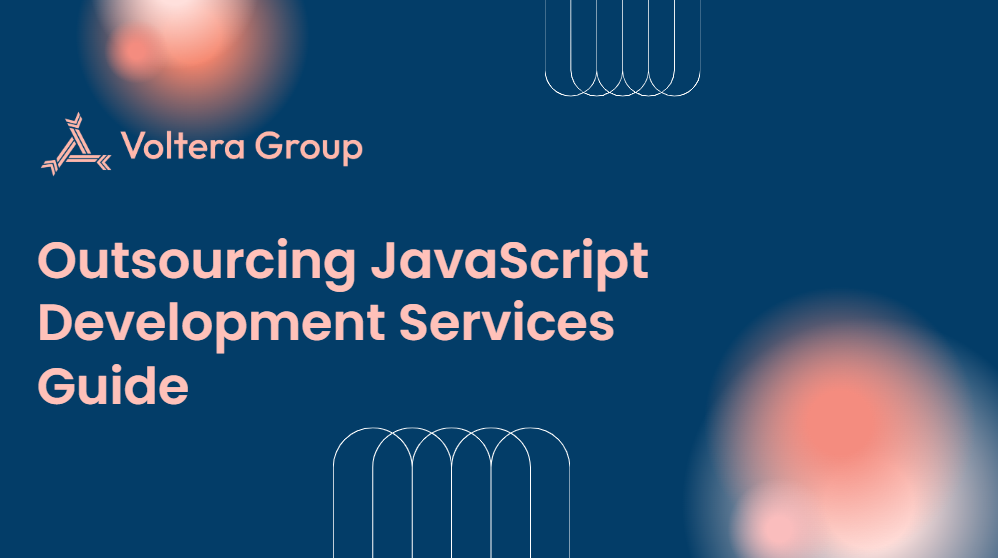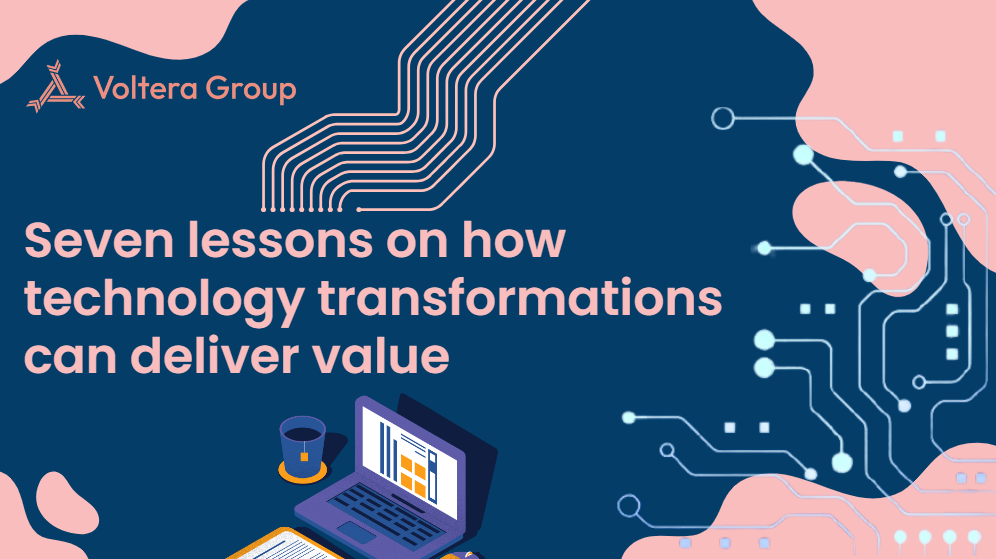Digital AI Transformation
Embracing digital transformation services propels modern organizations ahead of competition. The intricate nature of integrating digital technologies into operational frameworks presents significant challenges for businesses attempting implementation independently. Voltera Group employs a holistic methodology to digital transformation deployment, mitigating risks while maximizing investment returns.
Voltera Group's Digital Transformation Solutions
Unifies and optimizes information from disparate sources into a cohesive, readily accessible platform, enabling organizations to eliminate information silos, enhance strategic decisions, and develop comprehensive operational visibility.
Harnesses advanced artificial intelligence and machine learning capabilities to streamline processes, generate forward-looking insights, transform customer interactions, and catalyze strategic innovation throughout the organization.
Deploys and connects robust software ecosystems that coordinate essential business functions, enabling real-time information exchange, streamlined operations, and improved organizational efficiency across financial, human resources, supply chain, and other critical departments.
Assists organizations in modernizing technology infrastructure, automating workflows, and enhancing customer engagement by evaluating current systems, identifying optimization opportunities, and implementing tailored solutions including cloud migration, AI adoption, and analytics integration.
Transform stagnation into innovation – begin your digital evolution today!
The Essential Element in Digital Evolution
Enhancing Operational Performance
Digital evolution simplifies routine processes through automation of repetitive tasks, error reduction, and time conservation. Through comprehensive systems integration, organizations optimize resource allocation and improve scalability.
Elevating Customer Interactions
From conversational AI to personalized marketing initiatives, technological solutions foster customer satisfaction and loyalty. Through an integrated multi-channel strategy, you create consistent experiences across all customer touchpoints.
Creating Innovative Revenue Models
Digital transformation facilitates subscription-based services and on-demand offerings that generate revenue through novel channels. With appropriate technology implementation, businesses quickly adapt to evolving customer preferences while maintaining service delivery efficiency.
LLM Agent A
State-Of-Art Automation (Scheme)
LLM is not only the possibility to chat and get a wide range of information, but it's also the possibility to retrieve your local data from databases, docs, and spreadsheets. With advanced LLM Agents—a core part of generative AI as a service—you can automate your routine processes, streamline client communication, or implement your start-up ideas.

Discover the power of Generative AI development to drive unparalleled innovation in your industry.
Technologies of Artificial Intelligence and Machine Learning
How AI Works
AI integration connects proprietary systems to generative AI models without requiring in-house AI expertise. They handle complex technical details like model optimization, API management, and security compliance that most companies lack the resources to build themselves. This reduces generative AI solutions development time from months to days while ensuring reliable, enterprise-grade performance without disrupting existing workflows.
Current Environment Assessment
01
Conduct comprehensive evaluation of existing operational processes, technology infrastructure, and digital capabilities to identify improvement opportunities and performance gaps.
Strategic Implementation Planning
02
Develop clear, objective-oriented digital transformation roadmap aligned with business goals: implementation timeline, resource allocation, and anticipated outcomes.
Architecture Design
03
Create detailed execution frameworks for each transformation area—technical specifications, process redesigns, and system integration requirements.
Solution Implementation
04
Systematically execute planned changes, deploying new technologies and digital solutions throughout the organization.
Team Capability Development
05
Deliver comprehensive training programs and change management initiatives to ensure staff proficiency and adoption of new digital tools.
Continuous Performance Enhancement
06
Monitor transformation progress consistently, evaluate outcomes against established metrics, and refine implementations based on performance data and stakeholder feedback.
Generative AI Across Business Operations
Manufacturing Digital Transformation
- Production automation through advanced robotics to enhance efficiency and minimize downtime
- Predictive maintenance systems to prevent equipment failures and reduce operational interruptions
- Data analytics implementation to optimize supply chain logistics and inventory control
Financial Services Transformation
- AI and machine learning deployment for real-time fraud detection
- Digital platform development for personalized financial service delivery
- Automated compliance and regulatory reporting to minimize errors and improve efficiency
Enterprise-Wide Digital Evolution
- Cloud solution integration for enhanced cross-departmental collaboration and operational flexibility
- CRM implementation to strengthen customer engagement and sales performance tracking
- Process automation tools to streamline internal operations and boost productivity
Healthcare Digital Transformation
- Telehealth platform deployment to expand patient access and reduce facility visits
- AI implementation for accelerated diagnostics and customized treatment planning
- Patient record digitization for improved information access and management
Public Sector Modernization
- Citizen service digitization for simplified access to permits, licenses, and public records
- Data analytics integration to enhance policy development and resource allocation
- Cybersecurity enhancement to protect sensitive information and prevent security breaches
Digital Transformation Consulting
- Digital service implementation to simplify citizen access to government resources
- Analytics integration for evidence-based policy development and resource optimization
- Advanced security protocols to safeguard sensitive information and prevent unauthorized access
Insurance Industry Evolution
- Claims processing automation to accelerate settlements and improve customer satisfaction
- AI and analytics implementation for enhanced risk assessment and personalized coverage
- Conversational AI deployment to manage customer inquiries and streamline service delivery
Marketing Transformation
- AI and analytics integration for highly targeted campaign development
- Marketing automation platform implementation to optimize digital communication channels
- Real-time performance analytics to measure campaign effectiveness and investment returns
Supply Chain Modernization
- IoT sensor deployment for continuous inventory tracking and monitoring
- AI implementation for demand forecasting and inventory optimization
- Procurement process automation to reduce costs and eliminate operational bottlenecks
Retail Digital Evolution
- Analytics integration to understand customer preferences and personalize experiences
- Omnichannel platform deployment to unify in-store and online shopping experiences
- Conversational AI implementation to provide continuous customer support
Industrial Digital Transformation
- Automation and robotics integration to enhance production and safety standards
- Digital twin implementation for real-time equipment monitoring and process optimization
- IoT deployment for predictive maintenance and comprehensive asset management
Travel Industry Transformation
- AI integration for personalized travel recommendations and itinerary development
- Digital platform implementation for streamlined booking and customer service
- Automated loyalty program management and customer engagement optimization
Public Sector Modernization
- Service digitization to enhance citizen access to government resources
- Analytics implementation to improve public safety and emergency response capabilities
- Cloud platform deployment for enhanced interdepartmental communication and collaboration
Startup Digital Acceleration
- Administrative process automation to redirect resources toward growth initiatives
- Cloud solution implementation to enable global operations from inception
- Conversion optimization through intelligent digital marketing frameworks
The Essential Element in Digital Evolution
Legacy System Modernization
Digital services liberate organizations from outdated technology constraints without operational disruption. They create bridges between established.
Enterprise Data Unification
Our services consolidate dispersed information assets to establish authoritative data sources accessible throughout the organization. This ensures consistent information sharing between departments.
Process Optimization
Digital transformation identifies operational inefficiencies that impact team productivity and satisfaction. It replaces manual processes with automated workflows, allowing personnel to focus on high-value activities.
Market Responsiveness
Digital services provide the adaptability to pivot quickly as market conditions and customer requirements evolve. They deliver real-time insights and flexible tools that enable early trend identification.
Competitive Advantages with Our Gen AI Services
Frequently Asked Questions
What is the typical timeframe for digital transformation implementation?
Transformation duration depends on project scope and complexity, typically ranging from several months to multiple years. Smaller initiatives might require 6-12 months, while enterprise-wide transformations often extend to 1-3 years or longer.
What return on investment can we anticipate from digital transformation?
ROI varies by industry and solution type, with benefits realized through efficiency improvements, cost reduction, and enhanced user experiences. Most organizations achieve measurable returns within the first year, with long-term ROI substantially exceeding initial investments.
How do you ensure information security during transformation?
We implement comprehensive security measures—including data encryption, access control systems, and continuous monitoring—throughout the transformation process. Post-implementation security is maintained through regular updates, audits, and compliance verification.
Can implementation occur incrementally, or must it be comprehensive?
Incremental implementation is entirely feasible, beginning with targeted projects that demonstrate quick wins. This phased approach minimizes disruption and allows organizational adaptation at a manageable pace.
How will digital transformation impact our existing workforce?
Transformation typically requires skill development for employees working with new tools and processes. While some roles may evolve, this often creates professional growth opportunities rather than displacement.
What operational disruption should we expect during implementation?
Disruption levels depend on transformation scale and nature, but our methodical planning and phased implementation minimize impact. We typically schedule significant system changes during non-peak periods and provide comprehensive training to ensure smooth transitions.
Must we replace outdated IT infrastructure entirely?
Complete replacement is unnecessary—digital transformation begins by modernizing specific infrastructure components. We integrate new solutions with existing systems and gradually update legacy elements based on strategic priorities.
Can digital transformation facilitate market expansion or revenue diversification?
Digital transformation creates market expansion opportunities through e-commerce capabilities, digital service offerings, and data-driven strategies, while enabling new revenue models such as subscription services or personalized offerings.
What ongoing support is provided following initial transformation?
We offer continuous system monitoring, regular updates, technical support, and training programs to maximize your transformation benefits. Our objective is ensuring sustained success and adaptability as your organization evolves.
How does transformation affect supplier and partner relationships?
Digital transformation strengthens external relationships through enhanced data sharing and process transparency. Improved integration and collaboration tools streamline operations and increase mutual value creation.
What services do digital transformation companies typically provide?
Digital transformation providers generally offer cloud computing, analytics implementation, AI/ML integration, software development, and infrastructure modernization services. Many also provide digital strategy consulting, process automation, and customer experience enhancement.
Are specialized digital transformation consulting firms available?
Some consultancies specialize in specific transformation aspects, such as cloud migration, AI implementation, or sector-specific solutions for healthcare or financial services. Examples include organizations focusing on industry-specific transformations or technology-driven innovations.
What are typical costs for digital transformation services?
Engagement costs vary significantly, typically ranging from $50,000 to $500,000+ for medium to large-scale projects, depending on scope and complexity. Professional hourly rates usually range from $100 to $300, with premium firms commanding higher fees.



